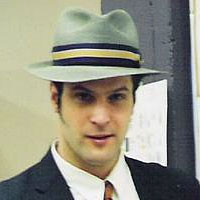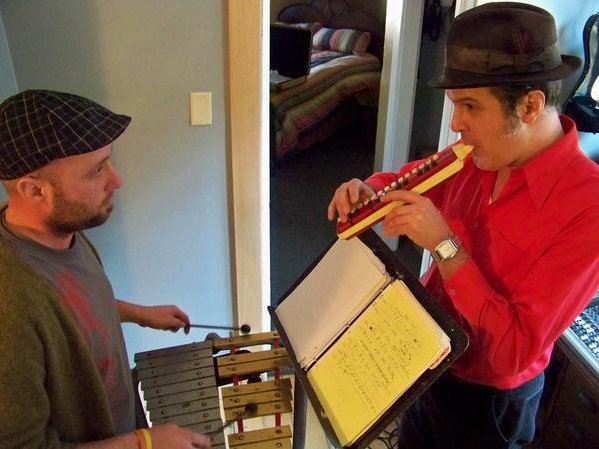At the Holiday Inn, a gated beach resort with free food and drink, dance instruction, and bingo, about a hundred or so guests, mostly from the United States, walk around in an expressionless daze, interacting only within their traveling party. A restaurant worker hacks with a machete at an endless supply of coconuts for the guests' drinking. A fierce thunderstorm knocks out the power several times, and we are back to airport in a shuttle bus.
The jumbo jet flight from Montego Bay to Kingston, the capital city located in southeast Jamaica, takes about an hour to board, prepare, taxi and deplane, and about 18 minutes in the air. A dread with a guitar bag looks at me and says, "You look like a jazz musician."
On the safety instruction video, computer-generated stewardesses show us how to buckle our seatbelts, while live flight attendants stand at attention in the aisles. The cabin lights flash on and off repeatedly, and trebly mood music of indeterminate origin plays on and off.
On the ride from the airport to Alpha Boys' School, the main reason for my visit, ABS Director Richard Foran and his wife, ABS Principal Sharon, take me over twisting and turning roads through dark, disorienting Kingston, past a noxious cement factory, the notorious Gun Court (recently renamed the South Camp Road Rehabilitation Centre), and Sabina Park, the new cricket stadium. My first night in Kingston I fall asleep to loud cricket songs, dogs barking in the yard and the rough deejay banter and occasional keyboard blast of an outdoor sound system.
Alpha Boys' School, established as a co-ed academy in 1880 by a Sister of Mercy named Jessie Ripoll, is now part of an enormous compound that extends for blocks and blocks in all directions in Allman Town, north of downtown Kingston, and also includes an infant school, two primary schools and a girls' high school. The Boys' School is by far the smallest of the schools, with about 160 students, all of whom live under constant adult supervision on the gated property. Alpha receives just over half its operating funds from the state, the rest from private contributors.
The boys here -- split into two groups based on age -- are wards of the state, placed here by family, concerned neighbors, police and various family courts. Parental death, disappearance, neglect and abuse are the major reasons. Most of the boys arrive with little or no reading ability. Alpha offers the boys top-quality education inside modest old buildings, as well as vocational training in agriculture, bookbinding, printing, woodwork and music. The boys have a very strict, regimented routine. They line up for class outside until the line is straight single file, walk in line to class and they line up after class. If a boy misbehaves, he is told to kneel on the ground for a certain amount of time. Corporal punishment is forbidden.
The school band, led by multi-instrumentalist Winston "Sparrow" Martin, is world renowned. The students practice and play (and consume meals) in Lennie Hibbert Hall, named after the late vibraphonist and Alpha bandmaster who recorded two excellent instrumental albums for the Studio 1 label, a major donor to Alpha, in the 1970s. School alumni include the late Skatalites founder/tenor saxophonist Tommy McCook, the late tenor saxophonist Roland Alphonso, the late trombonist Don Drummond, alto saxophonist Lester Sterling, trumpeter Johnny "Dizzy" Moore, trombonist Rico Rodriguez, alto saxophonist Headley Bennett, actor and reggae drummer Leroy "Horsemouth" Wallace, jazz saxophonists Dizzy Reece and (the late) Joe Harriott, trombonist Eddie "Tan Tan" Thornton, and Leslie Thompson, the first man of African descent to conduct the London Symphony.
My work at Alpha involves building a computer database of past students. No other school in Jamaica has such a resource. Alpha's database will be of tremendous genealogical, historical and cultural value, not to mention practical use for educational and employment purposes. My supervisor here, ABS Director Richard Foran, estimates that some 20,000 boys have passed through Alpha's gates. To create a coherent, legible database, I have had to learn how to read all sorts of legal and bureaucratic documents, with the help of my supervisors and their assistants. On Friday I began to create written guidelines for data entry in this database. By tomorrow I should have the final guidelines verified and approved by all, so I can train one of the director's extremely capable and good-natured assistants to find and enter relevant data relatively quickly and easily.
Last week the boys in higher grades took national standardized examinations, one for each of their academic subjects. This week all of the boys are taking their school exams. On weekends and weeknights, the boys have study and recreational time. For enjoyment they play soccer (barefoot, as almost nobody here owns athletic footwear), dominoes (usually French style), foosball, cricket with makeshift equipment made from tree branches and various discarded items and music. The boys not old enough to join the band use tree branches to drum on plastic oil containers, which sound like a herd of approaching oxen when beaten by two or more boys. The younger boys also fly kites they make from twigs and discarded metal, many with long tails made from rags, sophisticated designs and noisemaking attachments called zingers.
The boys wear a school uniform of short-sleeved shirts, short khaki pants and sandals. After school and on weekends, they wear T-shirts and any kind of shorts, as it is always warm and humid here. A recent donation has resulted in a profusion of boys in Bob Marley "Legend" tees. The boys address men as "sir" and women as "miss." My first evening among them was a little daunting -- jokes abounded on the theme of my black trilby's resemblance to the one worn years ago by Michael Jackson. I joined them in foosball and the jokes abated slightly.
The next evening I took a melodica out to the soccer field and blew for a while to ease my mind. Soon a crowd of about 20 gathered to watch and listen. Only when I stopped playing did the boys say a word. We discussed school, music (Sizzla and Vybz Kartel are the favorites of today), and life in America. The boys were completely different in their attitude from the evening before. They invited me into Lennie Hibbert Hall to play with various hornsmen, drummers, bassists and keyboardists. To my delight they knew Bobby Timmons' jazz standard "Moanin'" and "Rockfort Rock," the reggae standard based on the Cuban song "El Cumbanchero." The boys graciously allowed me to play their instruments, and asked to hear my songs. I obliged with a few, singing and playing the electric bass. Thank G_d the drummer on hand knew his ska, rocksteady, rockers reggae and dancehall rhythms.
Most nights for me end on the porch of my apartment upstairs from the print shop and bindery, where I write lyrics, listen to music and sometimes blow the melodica, which always makes one particular dog in the yard bark for at least an hour. There are four dogs and one cat here, all strays adopted and cared for by the boys. The boys are very kind to the animals, and I have yet to hear one curse word in or around the school.
Pleasant surprises abound, beginning immediately: on a lunch break last week, the school's driver, Mr. Reginald Mills, a guitarist with a band called the Cybernetics, took me to National Heroes Park, where we paid tribute at the monuments to Marcus Garvey, Paul Bogle, Alexander Bustamante, Sam Sharpe and Dennis Brown, then to Jamaica Recording and Publishing Company, the home of Studio 1, where Norma Dodd, widow of the late producer Clement "Sir Coxsone" Dodd, greeted us and the great deejay King Stitt showed us the studio.
On the weekend the ace taxi driver Lonsville Thompson zoomed over to Cling-Cling Avenue on the west side of town to the gates of an old deejay, where we chatted and plotted a collaboration. Then we were off downtown to King Street, lionized in song by Rita Marley's ska group the Soulettes. We checked out Liberty Hall, Marcus Garvey's first headquarters of the Universal Negro Improvement Association, and Kingston Bookshop, which carries many excellent local small press titles. King Street is bustling, but nearby Orange Street (hailed by Prince Buster on several recorded occasions) is utterly packed. Hordes of people, more densely crowded than anywhere in New York, Chicago, Paris, or London, walk the area for incredible bargains on all types of goods. The streets are covered with trash piled several feet high, and you smell the garbage trucks before you see or hear them.
Saturday night, the Pantry in New Kingston hosted an upwardly mobile crowd to a production of a new play -- some call it a roots play -- called "The Strength of a Woman." Directed by famous comedian Winston "Bello" Bell and featuring Audrey Reid, star of Don Letts' film "Dancehall Queen," the play centered around two highly dysfunctional families divided by class but united by common desires and a secret shared past. The play also touched on the monumental ongoing tragedy of gun violence in Kingston, the audience laughing almost constantly throughout.
Sunday was time to visit the church of Alexander Bedward, the 19th century pastor who formed the Native Baptist Church in August Town, a very poor area where all the people live in homemade shanties with roofing of corrugated iron (here they call it zinc fence). Bedward, memorialized in song by Prince Far I, preached a gospel of faith healing, baptism in the nearby Hope River and black power. The church, reduced to ruins by Hurricane Charlie in 1951, is not on any map. The people of August Town were very helpful and informative, and with one kind woman's direction, Leonard Williams, world's second greatest taxi driver, found the site in less than 60 seconds. A walk through the shell of the church, where the altar floor remains intact, was a haunting experience. The beautiful, sad saxophone melody of Prince Far I's tune played in my mind the rest of the day.







